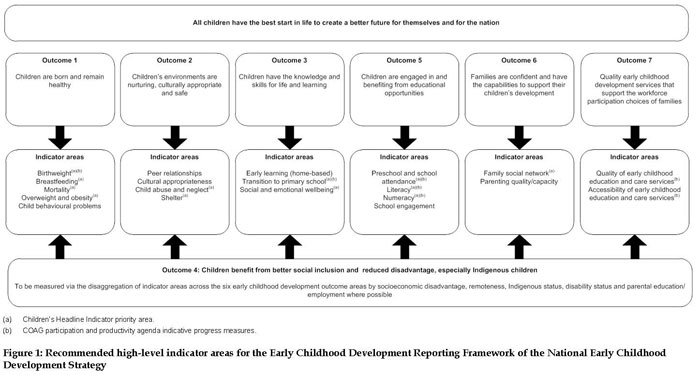Summary
The Council of Australian Governments released the National Early Childhood Development Strategy, Investing in the Early Years in July 2009 (COAG 2009). One of the key reform priorities in the strategy is to build better information and a solid evidence base, and establishing national outcome measures for early childhood development has been identified as one of the key projects to progress this. Developing an indicator-based reporting framework for early childhood development will enable monitoring of achievements against the Early Childhood Development (ECD) Outcomes Framework to inform the Council of Australian Governments of progress towards the vision that ‘by 2020 all children have the best start in life to create a better future for themselves and for the nation’.
This information paper outlines the process of developing an indicator-based reporting framework for early childhood development, and establishes a recommended high-level set of indicators to measure progress against the outcomes framework in the strategy.
Process undertaken
The development of an indicator-based reporting framework for early childhood development involved:
- reviewing existing national and international frameworks, and identifying key indicator areas through an extensive indicator mapping process
- reviewing national and international literature on early childhood development and outcomes
- developing conceptual models to count the relationships between all indicator areas within and across the outcomes in the outcomes framework
- consulting with key experts and stakeholders.
Indicator areas for early childhood development
The process outlined above identified 46 key areas that were considered most relevant to early childhood development and wellbeing outcomes. However the consultation process determined that fewer high-level indicators to measure progress for each of the outcomes in the ECD Outcomes Framework were needed. As a result, 20 potential indicators are recommended for reporting against the ECD Outcomes Framework in the ECD Strategy (Figure 1).
Data are currently available or will be available for reporting (by 2014) on 13 of these indicators, with data collection methodology and sources to be agreed for a further two indicators—social and emotional wellbeing and family social network. Indicators for the remaining 5 areas are not yet developed or defined—child behavioural problems, peer relationships, cultural appropriateness, school engagement and parenting quality/capacity—and require further work to conceptualise and establish the most important aspects for children’s health, development and wellbeing.
Figure 1: Recommended high-level indicator areas for the Early Childhood Development Reporting Framework of the National Early Childhood Development Strategy

Preliminary material: Acknowledgments
Introduction
- National Early Childhood Development Strategy background
- The project: national outcome measures for early childhood development
- Other related activities
Review of existing reporting on early childhood development
- Reviewing child and youth reporting frameworks
- Establishing framework domains
- Mapping the ECD Outcomes Framework to the key domains
- Indicator mapping
Literature review
Indicator areas for early childhood development
- Identification of key indicator areas
- Refining the number of indicator areas
- Selection of indicators for the Early Childhood Development Reporting Framework
- Next steps
Appendixes
Appendix 1: Ecological model
Appendix 2: Overview of early childhood development frameworks
Appendix 3: Literature review summaries
Appendix 4: Children’s Headline Indicators
Appendix 5: Summary of use of conceptual models
Appendix 6: Workshop participants
End matter: References; List of tables; List of figures



